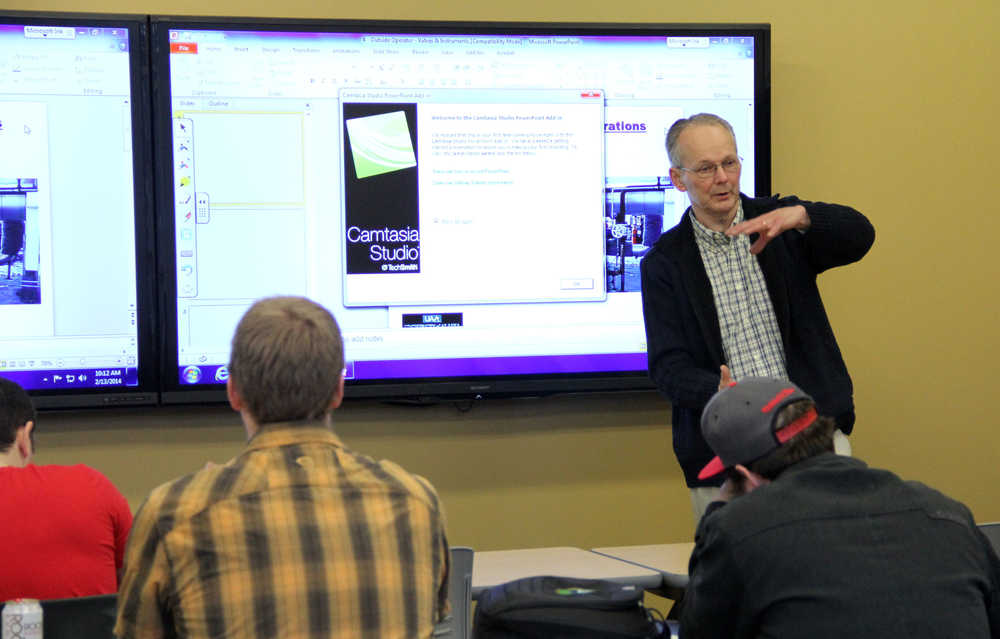While the newly opened Career and Technical Education Center at Kenai Peninsula College’s Kenai River Campus provides students with state-of-the-art technology students learn to proficiently operate, without instructors carrying years of industry experience, the equipment wouldn’t be much more than a jumble of pipes, valves and tanks.
Students from throughout Alaska and the Lower 48 ranging from recent high school graduates to experienced oil and gas industry workers come to the college and spend many hours in the classroom as well as making sense of the equipment to earn a degree industry employers want to see on resumes.
Assistant professors of process technology Henry Haney and Jeff Laube began teaching at the college in 2008 and 2009 and each harbors decades of industry experience.
“We save companies a lot of expense and give our students … not only book knowledge, academic knowledge, but also experiential knowledge,” Haney said. “So that they are at a certain level of expertise of base knowledge … that they can go ahead and begin to learn a specific process.”
Essentially, Haney said, they teach and train students to come onto a job at a level that otherwise would have taken them five to 10 working years to reach.
And with an 86 percent placement rate for program graduates — most of whom stay in the state — the college is seemingly producing a hot commodity.
KPC Director Gary Turner said the college works closely with the industry to produce students who learn how to do what the industry needs, which makes KPC graduates attractive to producers.
Along with a solid, desirable education, Laube said the students’ motivation and persistence in finding employment contributes to a high placement.
Laube and Haney have witnessed not only many recent graduates succeed in finding work, but also move up employment ladder quickly.
“As (graduates) move up, what I’m beginning to see,” Haney said, “is they have an influence on what’s taking place. So I see a time in the future where they’re going to be in positions of making decisions.”
The new center, along with process technology, also houses industrial process instrumentation and computer electronics. Suzie Kendrick, advancement program manager, said to get all three of those degrees is like a “slam dunk.”
“You’re very well versed by the time you leave,” she said.
Haney said the professors are encouraging students to pick up the additional degrees, especially with the industry getting more complex.
Robert Goerdt, a third semester process technology student, is considering getting a second degree in industrial process instrumentation to boost his employability. While Goerdt is originally from Alaska, he was studying at Kilgore College in Kilgore, Texas, but transferred up here because he heard the program was better.
Turner and Haney have both noticed a trend of more out-of-state transplants moving to the area to pursue a process technology degree at KPC because they hear the same thing Goerdt did.
“I want to be the best there is,” Haney said. “I want to see what we’re capable of and with this kind of facility we should.”
“We just need more instructors,” Kendrick said.
With some classes filling within half of an hour of registration opening, there’s no shortage of students. Turner said if the college could find more teachers with a degree and industry experience, the program could take on more students.
The students who do get into the courses are educated at a school and by instructors that are trailblazers in the program.
Laube worked with the technology department to set up the computer-based process simulator so students can use it remotely. KPC is the only school in the nation to have made that accommodation for students.
“We’re actually setting a lot of standards,” Haney said.
The simulator in the center has work stations, Haney said, which makes it easier for students to diagram and work with the equipment.
The last two years, Laube has presented on teaching process technology classes at the North American Process Technology Alliance Instructor Skills Conference and Haney served on the board of editors for two of the Center for Advancement of Petroleum Technology’s textbooks.
With second-generation students signing up for the program, Kendrick said the community knows KPC offers a quality degree.
“We’ve got a reputation that nobody else can even come close to,” she said.
Companies like BP, ExxonMobil and Shell, are aware of that reputation as well as they regularly come to campus and interview and recruit students.

